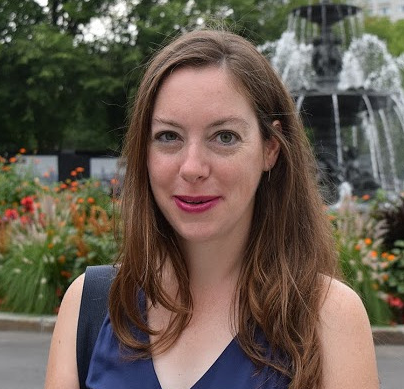
I am simply excited to publish this interview with Dr. Alexandra Luce, founder of Acuity Development, an expert on critical and creative thinking. Critical and creative thinking are today catchwords. However, the reality is that few people really understand what they are, their importance, and how to teach them. I am personally a follower of the Acuity Development newsletter, which is always insightful and which is always insightful and full of thought-provoking suggestions. And it is with my distinct pleasure to publish the interview on Scuola Filosofica – for those who don’t know it yet, is one of the leading philosophical blogs in Italy. In the name of Scuola Filosofica Team, our readers, and myself, Dr. Luce: thank you!
1. How would you like to present yourself to the Italian readers and to Philosophical School (Scuola Filosofica)?
Alexandra Luce is passionate about teaching people how to take their critical and creative thinking to the next level. Founder of Acuity Development Inc., she’s always learning and developing practical tools that help people get more from their thinking. Alex has developed graduate courses for institutions across North America, including the Royal Military College of Canada. She earned her BA at the University of Toronto, and her MPhil and PhD at the University of Cambridge. She lives in Montreal, teaches online, and loves to travel.
2. Critical thinking looks a meme of our time. However, when everything is critical thinking nothing is critical thinking. How would you define “critical thinking” and what is notcritical thinking?
I define critical thinking as thinking clearly, objectively and holistically. Asking lots of questions, including about your own thinking. Considering what’s missing or what might be wrong. Researching multiple viewpoints. Evaluating data (both quantitative and qualitative). Understanding context and connections. Being willing to change your mind based on what you learn.
Critical thinking is not simply accepting what’s been given to you, even if it looks good. It’s about digging deeper, seeing what’s really there and why it’s there.
3. Is critical thinking a single skill or a set of skills? How can it be improved? Training or knowledge?
It’s a set of skills and behaviours, and they can be improved with practice.
Skills include things like identifying and examining assumptions, assessing arguments, determining the significance of particular data, and analyzing implications.
It’s also important to be inquisitive, systematic and open-minded. Ideally, you’re actively open-minded: not only are you open to opposing viewpoints, you go a step further and seek out viewpoints that are different than your own.
Knowledge and training are important for critical thinking, but it’s by actually applying the skills and behaviours that you improve them. Put them into practice, get feedback, reflect, adjust based on the feedback and reflection, then do it all over again. It’s an ongoing cycle.
There’s an important mindset piece to this too: you’ve got to value growth more than you value being right. Valuing growth will get you through the discomfort your ego’s going to feel when you open your thinking up to critique, and when you realize you’re wrong about something. Also, it’s much easier to progress when you’re in an environment or community with others who prioritize growth and who are working actively to improve their critical thinking.
4. Looking at many job opportunities, critical thinking is 90% required in all the job applications. Why is critical thinking so required in the current job market?
It’s a popular phrase, and certainly lots of companies do need people who can solve problems.
Sometimes, though, there’s a disconnect between statement and action. For example, a company may say they want people with critical thinking skills, yet the company culture and processes disincentivize critical thinking when it’s uncomfortable (e.g. rethinking a line of business). Similarly, while many companies say they value creativity and innovation, they don’t do what’s necessary to cultivate it.
5. How can you be sure to be an effective “critical thinker”?
My first reaction was “Are you ever sure?”, which says something about my relationship with uncertainty! Seriously, though, here are two things that’ll help you assess your critical thinking:
- Ask others, whom you respect as strong critical thinkers, to assess your thinking on a particular issue. Ask them what you’re missing, what could make it better.
- Track your work. For example, if you’re making an important decision or a forecast, put your thinking in writing. Writing helps you consider things more thoroughly. Plus, you can look back at it later and assess that thinking.
Keep this up over time and you’ll become a more effective critical thinker.
6. Can you give us a picture of what Acuity Development is, and what it tries to achieve?
Acuity Development exists to help you expand and improve your thinking. It grew out of my work teaching intelligence analysis. The more people I taught, the more people whose thinking I observed, the more I realized that great thinking requires both critical and creative thinking. Neither of these is a magical talent that you either have or you don’t. Both are skills. Acuity Development provides the tools you need to improve these skills.
For example, we make assumptions every day, on small issues and big issues alike. But we aren’t naturally good at identifying our assumptions. Often we only see them in retrospect, after something’s gone wrong and caused negative consequences. So Acuity Development offers a free Assumptions Guide, with lots of examples and a step by step process you can use to unearth your assumptions, then see which ones have a solid basis in reality and which ones don’t. The more you use the process, the easier it gets and eventually it’ll become second nature.
7. How can our readers follow you?
I welcome readers to visit www.acuitydev.ca, where you can access programs, resources and Acuity News. And connect with me on LinkedIn or Instagram (I’m @alexluce_aqui).
8. Five words that describe you?
Curious. Creative. Joyful. Determined. Grateful.




Be First to Comment